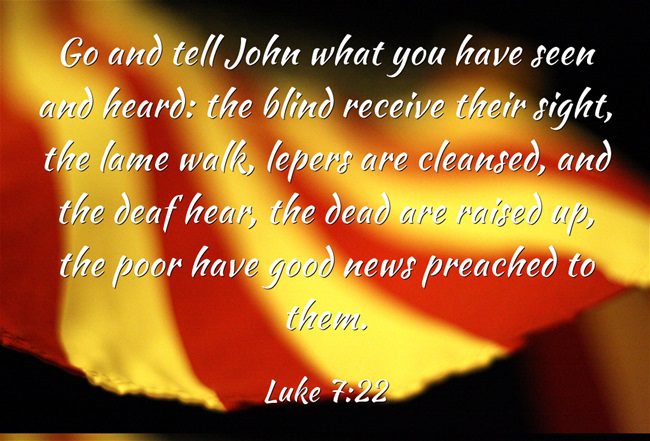What is the good news that is mentioned in the Bible? Why is it called the “good news?”
The Bad News
Have you ever had someone tell you “I’ve got bad news and I’ve got good news for you. Which do you want to hear first?” I usually like to hear the bad news first so that it gets better after that. The way the Bible is written, the bad news is usually presented first and only then comes the good news because the good news is meaningless until you first learn about the bad news and only then is the good news really good. So what is the bad news? The bad news is that our sins have separated us from a holy God (Isaiah 59:2) and that even our best efforts at good works are seen as filthy rags to God (Isaiah 64:6). The fact is, most people think that they’re a good person but Romans 3:10-12 says that we’re “all under sin” and “None is righteous, no, not one. No one understands; no one seeks for God. All have turned aside; together they have become worthless; no one does good, not even one.” Every single one of us falls far short of the glory of God (Rom 3:23) and the only thing we’ve earned are the wages of sin and that means death (Rom 6:23). Before we trusted in Christ “All of us used to live that way, following the passionate desires and inclinations of our sinful nature. By our very nature we were subject to God’s wrath, just like everyone else” (Eph 2:3). That’s the bad news. Now, isn’t it time for some good news after all that?
The Good News in the Old Testament
In the days of ancient Israel, they had runners who brought bad news and good news and they could usually tell whether the runner had bad news or good by the way they were running (2nd Sam 18:27) and indeed, “good news refreshes the bones” (Prov 15:30b). God spoke through Isaiah the prophet and said “Go on up to a high mountain, O Zion, herald of good news; lift up your voice with strength, O Jerusalem, herald of good news; lift it up, fear not; say to the cities of Judah, “Behold your God” (Isaiah 40:9)! God Himself declares again through Isaiah, “How beautiful upon the mountains are the feet of him who brings good news, who publishes peace, who brings good news of happiness, who publishes salvation, who says to Zion, “Your God reigns” (Isaiah 52:7). The good news then is good news now; God brings salvation and to Him we owe our gratitude and praise. As a taste and a forerunner of the Messiah to come, Isaiah wrote something that Jesus would declare almost 800 years later, “The Spirit of the Lord God is upon me, because the Lord has anointed me to bring good news to the poor; he has sent me to bind up the brokenhearted, to proclaim liberty to the captives, and the opening of the prison to those who are bound” (Isaiah 61:1).
The Good News of Jesus Christ
When an angel came to the shepherds in the field one night, “the angel said to them, “Fear not, for behold, I bring you good news of great joy that will be for all the people” (Luke 2:10). This was the “good news” prophesied to come by Isaiah. Jesus sat down in the synagogue once and fulfilled what is written in Isaiah 61:1 when He said “The Spirit of the Lord God is upon me, because the Lord has anointed me to bring good news to the poor; he has sent me to bind up the brokenhearted, to proclaim liberty to the captives, and the opening of the prison to those who are oppressed, to proclaim the year of the Lord’s favor” (Luke 4:18-19) and then “he rolled up the scroll and gave it back to the attendant and sat down. And the eyes of all in the synagogue were fixed on him. And he began to say to them, “Today this Scripture has been fulfilled in your hearing” (Luke 4:20-21). It was “Soon afterward he went on through cities and villages, proclaiming and bringing the good news of the kingdom of God. And the twelve were with him” (Luke 8:1). With the long awaited Messiah, Jesus Christ, this Scripture was fulfilled, but now what?
The Good News in the New Testament
Up until Jesus arrived and John the Baptist’s ministry ended, Jesus said, “The Law and the Prophets were until John; since then the good news of the kingdom of God is preached, and everyone forces his way into it” (Luke 16:16) but now, with Jesus’ arrival, the good news was to be taken to all the world (Matt 28:19-20; Acts 1:8). The gospel or the good news, for they are one and the same, was spreading, for example, “when they believed Philip as he preached good news about the kingdom of God and the name of Jesus Christ, they were baptized, both men and women” (Acts 8:12). The word “gospel” is the translation of the Greek word “evangelion” (ev or eu meaning “good” and angelion meaning “message”) so the good news is the gospel and the gospel is the good news. It is a good message for bad people who can be forgiven by a good God.
Conclusion
The good news or the gospel is not received well if a person doesn’t hear the bad news first and that is that they have the wrath of God on them if they disbelieve in Jesus (John 3:3b). The bad news makes the good news (the gospel) all the greater to hear. This is the gospel, just as Isaiah and Jesus said, “The Spirit of the Lord God is upon me, because the Lord has anointed me to bring good news to the poor; he has sent me to bind up the brokenhearted, to proclaim liberty to the captives, and the opening of the prison to those who are oppressed, to proclaim the year of the Lord’s favor” (Luke 4:18-19).
Article by Jack Wellman
Jack Wellman is Pastor of the Mulvane Brethren church in Mulvane Kansas. Jack is also the Senior Writer at What Christians Want To Know whose mission is to equip, encourage, and energize Christians and to address questions about the believer’s daily walk with God and the Bible. You can follow Jack on Google Plus or check out his book Blind Chance or Intelligent Design available on Amazon.
















